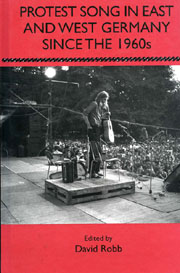Book contents
- Frontmatter
- Contents
- Acknowledgments
- Introduction
- 1 The Reception of Vormärz and 1848 Revolutionary Song in West Germany and the GDR
- 2 Mühsam, Brecht, Eisler, and the Twentieth-Century Revolutionary Heritage
- 3 Narrative Role-Play as Communication Strategy in German Protest Song
- 4 The Burg Waldeck Festivals, 1964–1969
- 5 The Folk and Liedermacher Scene in the Federal Republic in the 1970s and 1980s
- 6 Konstantin Wecker: Political Songs between Anarchy and Humanity
- 7 Wolf Biermann: Die Heimat ist weit
- 8 Political Song in the GDR: The Cat-and-Mouse Game with Censorship and Institutions
- 9 The Demise of Political Song and the New Discourse of Techno in the Berlin Republic
- Works Cited
- Notes on the Editor and Contributors
- Index
9 - The Demise of Political Song and the New Discourse of Techno in the Berlin Republic
Published online by Cambridge University Press: 05 February 2013
- Frontmatter
- Contents
- Acknowledgments
- Introduction
- 1 The Reception of Vormärz and 1848 Revolutionary Song in West Germany and the GDR
- 2 Mühsam, Brecht, Eisler, and the Twentieth-Century Revolutionary Heritage
- 3 Narrative Role-Play as Communication Strategy in German Protest Song
- 4 The Burg Waldeck Festivals, 1964–1969
- 5 The Folk and Liedermacher Scene in the Federal Republic in the 1970s and 1980s
- 6 Konstantin Wecker: Political Songs between Anarchy and Humanity
- 7 Wolf Biermann: Die Heimat ist weit
- 8 Political Song in the GDR: The Cat-and-Mouse Game with Censorship and Institutions
- 9 The Demise of Political Song and the New Discourse of Techno in the Berlin Republic
- Works Cited
- Notes on the Editor and Contributors
- Index
Summary
Holger Böning, in his 2004 bookDer Traum von einer Sache: Aufstieg und Fall der Utopien im politischen Lied der Bundesrepublik und der DDR, writes that the respective conditions in the two German states gave rise to a particular counterculture (“Gegenöffentlichkeit”) in which the political song prospered — in the 1960s in West Germany and from the 1960s up until 1989 in the GDR. It resulted from a situation in which mainstream political and cultural discourse was thoroughly at odds with unofficial discourse, that is, the opinions and debates of the people. One could argue that by the mid to late 1970s in West Germany this crisis was already considerably mitigated by a political system that was flexible enough to integrate many countercultural initiatives into mainstream public policy. In the GDR on the other hand the crisis persisted up until 1989. By the onset of 1990 and unification, however, it was clear that the conditions for a broad, popular political song movement no longer existed in any part of Germany. Songs of Wenzel and Mensching and Gundermann, who are among the few key Liedermacher who survived the fall of communism, will be analysed in this chapter. In view of the crisis, however, which the political song has entered in the past years, this chapter will culminate in an investigation into new possibilities for political expression in music by taking developments in techno into consideration.
- Type
- Chapter
- Information
- Protest Song in East and West Germany since the 1960s , pp. 255 - 278Publisher: Boydell & BrewerPrint publication year: 2007



